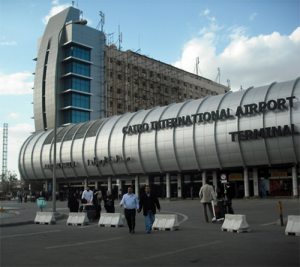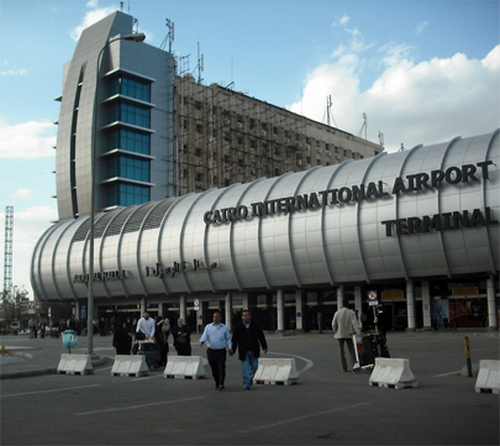
(AFP PHOTO)
By Rana Yehia
Cairo International Airport’s Terminal 2 will witness its soft opening in November this year, with the official opening expected in March 2016.
The soft opening comes as part of the Ministry of Civil Aviation’s plan to expand the absorptive capacity of its airports.
The ministry’s plan aims to reach 75.5 million passengers annually by 2020, compared to the current 54.5 million, through developing and expanding airports, Minister of Civil Aviation Hossam Kamal said earlier this month.
This strategy comes in line with the Tourism Ministry’s strategy to reach 20 million tourists by 2020. Expansion projects have begun in numerous airports, while others are awaiting financing.
The expansion of Cairo International Airport’s Terminal 2 is expected to add 7.5 million passengers to its annual capacity, increasing total capacity of the airport to reach approximately 30 million passengers per year.
A new terminal has been established and inaugurated at Hurghada Airport with the capacity of 7.5 million passengers, increasing the airport’s total capacity to 13.5m passenger per year, at a total cost of EGP 2.3bn.
The building was funded by the Arab Fund for Economic and Social Development (AFESD), and implemented by the Saudi Binladen Group.
The new three-storey terminal’s area is approximately 92,000 sqm, and includes 72 counters, 20 departure gates and a duty free shopping area.
As for the Sharm El-Sheikh Airport Expansion project, passenger capacity is set to be expanded to reach 18 million per year, compared to its current 8 million passengers. A new terminal will be built, with a capacity of 10 million passengers annually, as well as a new runway and control tower.
Funding for the project will be provided by the Islamic Development Bank (IDB) throughlease financing of $445m, and $140m from the African Development Bank (AfDB).
Moreover, a new terminal is expected to be built in Borg El-Arab Airport, with the capacity of 4 million passengers annually, increasing the total capacity to 5.2 million passengers compared to the current 1.2 million.
The expansion will be funded by the Japanese International Cooperation Agency (JICA) with a soft loan of EGP 1.2bn. The loan has a grace period of 10 years and a repayment period of 40 years, at an interest rate of 0.1%. The airport will be eco-friendly, operating through renewable energy, such as solar and waste energy.
“Expanding in Egyptian airports is a positive step, as the government is expecting an increase in touristic flows and is planning ahead for it,” said head of the Private Airlines federation, Hassan Aziz.
He added that even if flows do not significantly increase this year, they could increase next year, and the Ministry of Civil Aviation is doing well by preparing airports for the expected flows.
Expanding existing airports is not enough, as the government is targeting promoting tourism; we must have good infrastructure in airports and roads, Aziz added.
“We also need new airports in several places like Ras Sedr, Ain Sokhna, Port Said and Alexandria in order to serve the Suez Canal. It might as well enter the “one day” tourism from Cyprus and Greece to Alexandria and Port Said,” Aziz said.
Regarding the role of airports expansion and promoting tourism, CEO of Blue Sky travel company Hany Al-Shaer said: “These projects will indeed help promoting tourism, as any step taken in the way of developing airports and touristic institutions will help, but we can’t say now the percentage of tourism increase due to the expansion.”
Numerous other steps must also be taken to promote tourism, the most significant of which is providing security. Egypt also needs a strong promotional tourism campaign that reaches out to tourists in their countries and in their languages, introducing Egyptian touristic destinations, Al-Shaer added.



